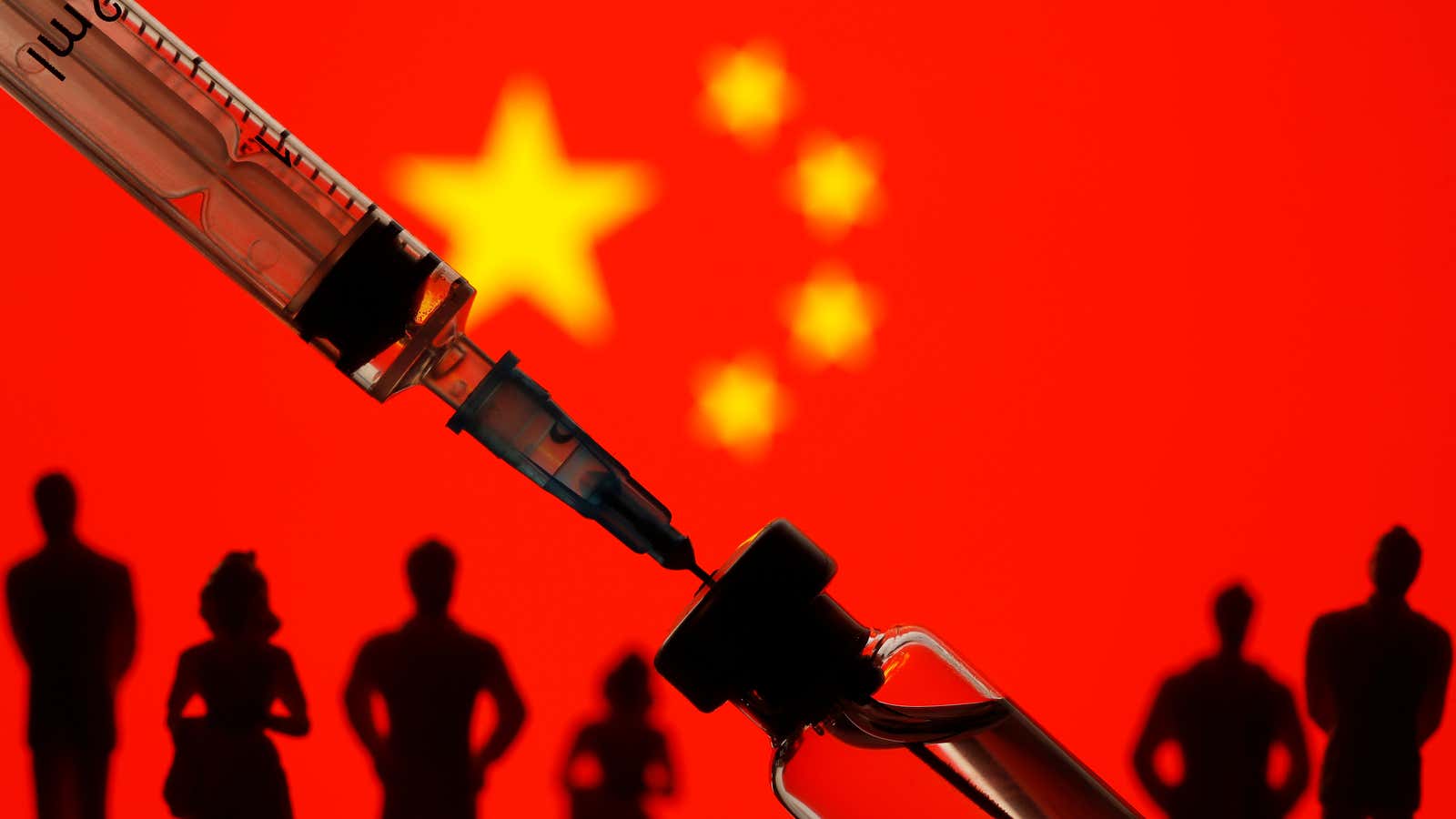In the early days of the coronavirus pandemic, China sent millions of masks and protective equipment to countries around the world in an effort to leverage the Covid-19 crisis for diplomatic gains. People dubbed it “mask diplomacy,” as Beijing jostled to control the pandemic narrative and use the crisis to boost its vision for the new world order.
Mask diplomacy has now given way to vaccine diplomacy—but not only of the positive kind. Though much of China’s efforts have revolved around championing the Covid-19 vaccines of three domestic pharmaceutical firms, in recent days state propaganda has sought to undermine public trust in the vaccine developed by US pharmaceutical giant Pfizer and Germany’s BioNTech.
Over the past week, major propaganda outlets including Xinhua, People’s Daily, and China Daily have all published articles about the deaths of elderly shot recipients in Norway, and accused English-language media of downplaying the deaths even though multiple outlets carried reports of them. Nevertheless, an editorial from the nationalistic tabloid Global Times questioned why US media were “silent on Pfizer deaths,” and another article several days later quoted Chinese urging Australia to halt the use of the Pfizer vaccine.
Chinese state media reports also distorted the words of the Norwegian Medicines Agency, Oslo’s national drug regulatory body, to suggest a causal link had been established. China Daily, for example, said in its headline that health authorities said the deaths were “likely related to vaccine.” This is inaccurate at best.
While Norway’s regulators said they “cannot rule out” that typical and mild reactions such as fever could contribute to death in a frail patient, they also explicitly stated (pdf) that reports of adverse reactions “[do] not necessarily imply that a causal relationship has been established between the event and the vaccines.” On Monday (Jan. 18), Norway reiterated that there was no evidence of a direct link between the vaccine and the deaths, and said its vaccine guidelines remained unchanged. The first vaccine doses in Norway, as in many places, have been given to the oldest and most ill citizens, who are also therefore the most likely to die of any cause in the weeks and months following.
Numerous international outlets that have since reported on the at least 33 elderly deaths among more than 48,000 people who have received the vaccine, but have been careful to note that it is as yet unclear how directly related the deaths are to the jab. But Chinese state media, by insinuating that the Pfizer vaccine had deadly effects, plays a dangerous game of spreading disinformation, fanning the flames of the anti-vaccine movement at a time when the World Health Organization has declared vaccine hesitancy as one of the world’s greatest health threats.
In a similar vein, a prominent state-television anchor, Liu Xin—perhaps best known abroad for her 2019 debate with Fox television host Trish Regan—tweeted last weekend demanding to know why foreign media were ignoring news of 10 deaths in Germany shortly after receiving the Pfizer vaccine. The tweet was also shared by the Chinese foreign ministry’s most abrasive voice.
So far, however, there is no evidence linking the vaccine to the German deaths. As Brigitte Keller-Stanislawski, head of medical products and devices safety at Germany’s Paul Ehrlich Institute, the country’s vaccines body, noted (link in German), all deaths were of seriously ill patients and “we assume that the patients died of their underlying disease.”
China’s focus on the Norway deaths comes in the wake of English-language reporting on the efficacy results of the Chinese vaccines, and the sparse data accompanying them—which have been seen by some as a concerted effort to cast doubt on the Chinese vaccines. These vaccines are an important source of national pride, a sign that the country is competitive in science and technology with other advanced economies in the race to develop safe and effective Covid-19 vaccines that are widely used. They also offer the perfect opportunity to repair diplomatic ties damaged by its perceived failures in the early days in the pandemic, and strengthen strategic relationships amid intensifying global criticism of its human rights violations in Hong Kong and Xinjiang.
The country has sent millions of doses of the Sinopharm and Sinovac shots to countries around the world, even though the latter’s CoronaVac shot reported disappointing efficacy data earlier this month. Meanwhile, Sinopharm has claimed in a sparse disclosure that its vaccine is over 79% effective.
This week, one of the purchasers of China’s Sinovac vaccines, Philippines president Rodrigo Duterte used the deaths to scorn senators who were urging authorities to prioritize securing Pfizer vaccines by asking them if they “want” the same situation as Norway. The Chinese edition of Global Times quickly reported on the exchange, writing in its headline (link in Chinese), “Duterte: You want the Pfizer vaccine? Remember Norway? I’ll order it for you.”
This isn’t the first time China’s tried to influence understanding of the pandemic, both at home and abroad. Notably, Chinese officials have spread conspiracy theories that suggest that the coronavirus might have been brought to China from the US, rather than originating in Wuhan, where the first outbreak occurred. Just days after the arrival in China of a WHO team in the city to investigate the pandemic’s origins, the Chinese foreign ministry began publicly pushing a conspiracy theory that a US military lab could well be the origin of Covid-19.
It’s understandable, given hostility to people of Chinese origin during the pandemic, why a theory that China’s not to blame might get traction at home. But China has already has experience of the dangers of disinformation in the pandemic—quashing genuine information circulated among doctors as “rumors” at an early and crucial state of the outbreak. With the stakes so high for the successful global rollout of Covid-19 vaccines—tens of thousands of lives and a semblance of some form of return to normality—an effort to intentionally sow doubts about their safety could be China’s most dangerous pandemic disinformation strategy yet.
